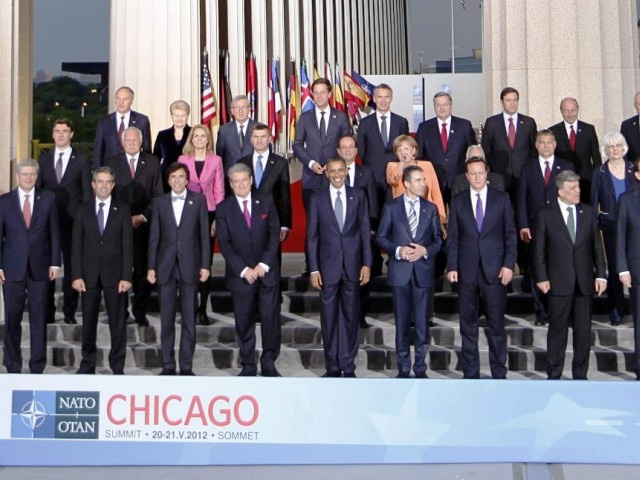The Europeans Seek an Honorable Exit from Afghanistan
NATO’s retreat in Chicago

The two-day NATO executive summit in Chicago has come to an end. Despite the fact that Western officials, including the NATO Secretary General had strongly predicted positive results for this summit beforehand, its conclusion and the final statement issued were a sign that the summit had not been able to achieve its previously announced goals. The outcome of the Chicago Summit can even be considered as a step back in comparison with the previous Executive Summit in Lisbon.
"To stay, or not to stay" in Afghanistan is the biggest question that NATO leaders were asking themselves in Chicago. Despite the fact that the US insists on staying in Afghanistan until the end of 2014, the new French President Francois Hollande has emphasized that he intends to pull out his country's troops from Afghanistan as soon as possible. While stating that one of his principal campaign promises was to immediately pull out French troops, Hollande said that he cannot break this promise he has made to the people of his country. Therefore, French troops will leave Afghanistan by the end of this year, two years before what had been scheduled at the Lisbon Summit. On the other hand, even though the final statement of the Chicago Summit announced "positive steps in the resolution of problems facing Afghanistan", the truth is that the rift between NATO members on the issue of Afghanistan has grown bigger and bigger.
The widespread economic crisis, whose effects can be observed in the decrease of military and defense budgets of member nations, has caused those nations to have no increase in the payment of their shares in order to provide long-term budgets for NATO missions.
On the other hand, the US is no longer able to increase its share in NATO's budget as before. NATO currently depends on the US for more than seventy percent of its budget. It is for this same reason that the NATO Secretary General has expressed concern over the decrease in the defense budgets of member nations and predicted, "The decrease in the defense budgets of member nations will gradually transform Europe into a paper tiger, militarily."
The Chicago Summit showed that NATO seriously intends to leave Afghanistan. The question is no longer "to stay or not to stay", but the question of "how to leave Afghanistan" is the main issue NATO faces and which it needs to honorably respond to in the next couple of years.
The announcement, in the final statement, of the complete plan for the transfer of the responsibility of providing security for the people and cities of Afghanistan to Afghan forces by the end of May 2013, and then playing a supportive role for them until the end of 2014, shows that NATO seeks an honorable exit from Afghanistan. However, the summit was not able to introduce a specific plan for this exit. Even though, because of the participation of Pakistani President Zardari in the Chicago Summit, much attention in political circles was paid to the probability of Pakistan opening NATO's communication and transfer lines before the talks, it became clear after the summit that some differences of opinion still exist in this regard, and Pakistan is not willing to reopen NATO's communication lines without being properly guaranteed that no more air attacks will be made against this country.
NATO's Missile Defense Shield plan was also one of the important issues that attracted the attention of international observers. Rasmussen's announcement of the achievement of the preliminary and administrative steps of the first part of the NATO plan is not only not a special feat, but the truth is that these statements are just a repetition of the general agreements made at the 2010 Lisbon Summit.
This announcement means that the plan to defend NATO member countries from ballistic missiles has been implemented. This is while many member countries and critics of this plan state that the probability of a ballistic missile attack against Europe is negligible, and the exaggeration of the threat on the part of NATO is just a way to put pressure on Russia and Iran.
Russia has given many warnings with regard to the implementation of this plan, and it has even threatened to put in place its long-range Iskander missiles in response to the NATO plan. Iran generally does not possess missiles that could threaten the European continent and experts believe that Iran is not a missile threat to Europe. NATO affairs analysts believe that mentioning Iran as a missile threat to Europe is just a way to put pressure on Iran and an attempt to halt its peaceful nuclear program.
In this step, NATO's Missile Defense Shield is supposed to be strengthened by the US' anti-missile warships in open waters. This will certainly create even more costs for this country's military and defense budgets.
Considering what has been said and taking a look at "NATO's roadmap" that was ratified at the 2010 Lisbon Summit, and also considering the ever growing financial crisis in member countries, it seems that the Chicago Summit did not result in positive outcomes for NATO members, even though the NATO Secretary General called the Chicago Summit "the start of a new mission".

